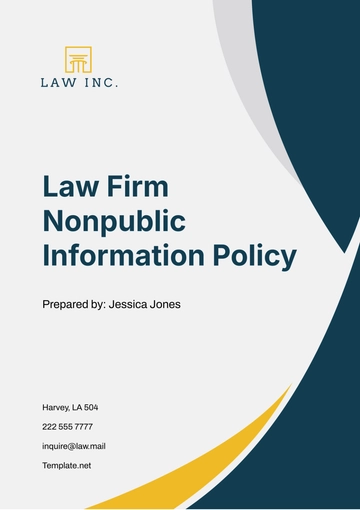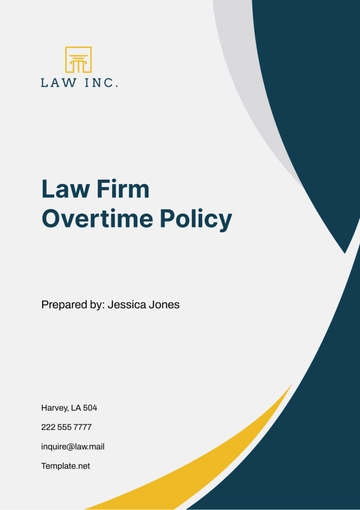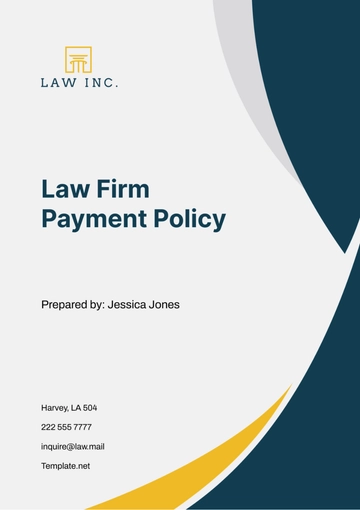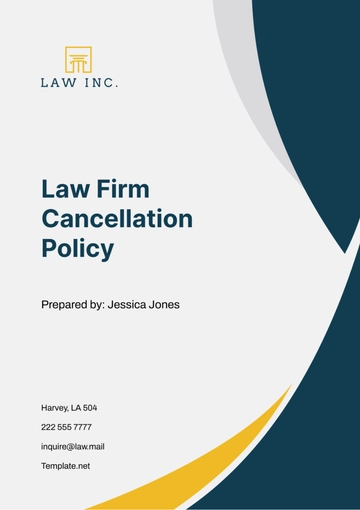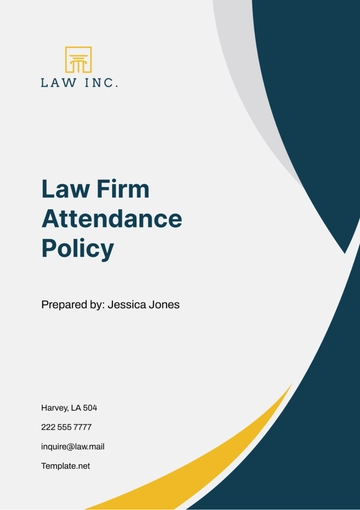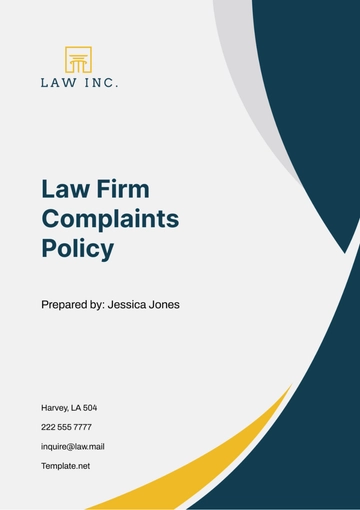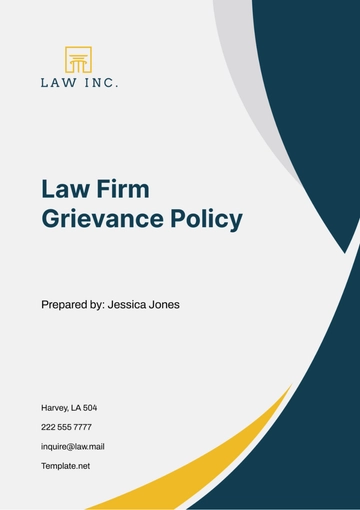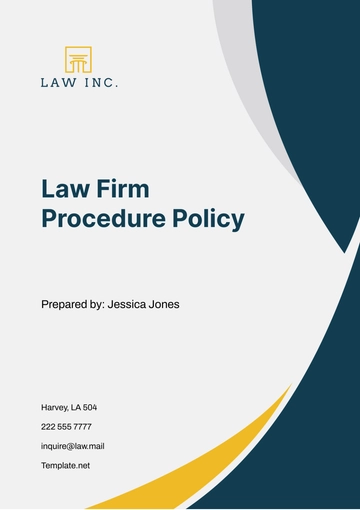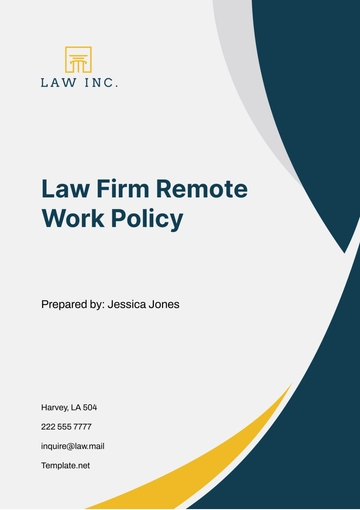Free Law Firm Financial Policy

I. Introduction
The purpose of this Financial Policy is to define the terms and guidelines under which financial transactions will occur between our clients and us. This policy ensures that all financial dealings are handled with transparency and fairness, providing clear information about billing, payments, and other financial obligations. The scope of this policy covers all financial interactions associated with the legal services we provide.
II. Billing Procedures
A. Fee Structures
We employ various fee structures to accommodate the diverse needs and circumstances of our clients. These include:
Hourly Rates: Clients are billed based on the actual time our attorneys spend on their case. The rate per hour depends on the complexity of the matter and the expertise of the handling attorney.
Fixed Fees: For services where the scope is clearly defined, such as drafting standard contracts or performing routine procedures, we offer a fixed fee option. This fee is agreed upon before the commencement of the work.
Contingency Fees: In certain cases, such as personal injury lawsuits, we may work on a contingency fee basis, meaning our fee is a percentage of the settlement or award obtained. This percentage is agreed upon at the initiation of representation.
B. Billing Frequency
Invoices are issued monthly to ensure a consistent and predictable billing cycle. This frequency helps both our clients and our firm manage finances effectively, providing timely updates on accrued legal fees and disbursements.
C. Itemization of Services
Each invoice clearly itemizes the services provided. This includes detailed descriptions of the work performed, the amount of time spent, and the professionals involved. Disbursements and expenses incurred on behalf of the client, such as filing fees, are also itemized to maintain full transparency.
III. Payment Terms
A. Payment Methods
To facilitate convenient payment, we accept several methods:
Checks
Credit cards
Electronic bank transfers
Online payment platforms (such as PayPal)
B. Due Dates
Payment is due within 30 days from the date of the invoice. This provides clients sufficient time to review their invoice and arrange for payment. Specific due dates are clearly marked on each invoice to avoid any confusion.
C. Late Payment Penalties
To encourage timely payments, late payments are subject to penalties. An interest rate of 1.5% per month is applied to the outstanding balance of late payments. Additionally, if payment is delayed beyond 60 days, we may initiate collection procedures, which could include pausing ongoing legal work until the account is settled.
IV. Retainer Fees
A. Initial Retainer
An initial retainer fee is required for most legal matters to establish a financial commitment and to cover initial costs and time expended on a case. The amount of the retainer fee is determined based on the expected complexity and duration of the matter. This fee must be paid upfront before any legal services are provided.
B. Retainer Top-Up
The retainer must be replenished under the following conditions:
When retainer balance falls below 25% of the original amount.
If upcoming legal actions require expenses exceeding retainer balance.
Prior to engaging in extensive or unexpected legal proceedings not initially anticipated.
C. Use of Retainer
The retainer is applied to invoices as services are rendered. Each invoice will detail the amount deducted from the retainer and any remaining balance. When the matter is concluded, any unused portion of the retainer will be refunded to the client or can be applied to future legal matters upon the client's request.
V. Fee Disputes
In the event of a dispute over fees, clients are encouraged to follow these steps:
Review the detailed invoice and identify specific charges in question.
Contact our billing department within 15 days of invoice receipt to discuss any concerns or discrepancies.
Provide documentation or explanations supporting the dispute.
If the dispute cannot be resolved through direct communication, clients may opt for mediation or, as a last resort, arbitration.
VI. Refunds and Adjustments
A. Conditions for Refunds
Refunds are issued under the following circumstances:
If retainer is overestimated and billed services are less than paid retainer.
If a client overpays due to a billing error.
If services are discontinued by either party and a balance remains from the prepaid retainer.
B. Adjustment Procedures
Once an error is identified or reported, our billing department will review the invoice and related documentation. If an adjustment is warranted, the corrected amount will be reflected in the next billing cycle or, if preferred by the client, refunded directly. All adjustments will be communicated to the client with an explanation for the change.
VII. Financial Hardship
A. Hardship Policy
We recognize that clients may occasionally face financial difficulties that could impact their ability to meet their financial obligations to our firm. In such cases, we offer the following options to assist clients in managing their payments:
Payment Plans: Clients may request to pay their bills in smaller, more manageable installments.
Reduced Rates: On a case-by-case basis, we may offer reduced rates for our services to accommodate a client's financial situation.
Deferred Payment: Under certain conditions, we may agree to defer payment for a specified period until the client's financial situation improves.
B. Eligibility Criteria
To qualify for financial hardship considerations, clients must meet the following criteria:
Demonstration of genuine financial distress through recent financial statements or proof of sudden financial hardship (e.g., job loss, medical emergency).
A history of prompt previous payments before the onset of financial difficulties.
Open and honest communication about their financial situation and timely notification of their inability to meet payments.
VIII. Collection Practices
A. Collection Procedures
If payments are not received by the due date and no communication is received from the client regarding their payment intentions, the following steps will be taken:
Reminder Notices: We will send up to three reminder notices at weekly intervals.
Direct Contact: If there is no response to the notices, a member of our billing department will attempt to contact the client directly by phone or email.
Payment Arrangements: We will attempt to negotiate alternative payment arrangements if the client expresses financial difficulty.
B. Third-Party Collections
Accounts may be turned over to a third-party collection agency under the following conditions:
Failure to respond to our communication attempts.
Failure to engage in negotiations for alternative payment arrangements.
An outstanding balance that remains unpaid for more than 90 days past the due date.
Prior notification to the client about our intention to escalate the matter to a collection agency, giving them a final opportunity to settle their account.
IX. Confidentiality of Financial Information
We are committed to protecting the confidentiality and security of our clients' financial information. All client financial data is stored securely and is only accessible to authorized personnel within our firm. We use industry-standard encryption and security protocols to prevent unauthorized access and ensure that financial information is handled with the highest degree of integrity and confidentiality.
X. Policy Modifications
Our Financial Policy may be updated or modified periodically to reflect changes in our practice or in response to regulatory adjustments. Any amendments will be communicated to our clients through official communication channels, such as email notifications or updates on our website, at least 30 days before they take effect. Clients are encouraged to review any updated policies to remain informed of their rights and obligations under our terms of service.
- 100% Customizable, free editor
- Access 1 Million+ Templates, photo’s & graphics
- Download or share as a template
- Click and replace photos, graphics, text, backgrounds
- Resize, crop, AI write & more
- Access advanced editor
Keep your firm’s finances clear and compliant with the Law Firm Financial Policy Template from Template.net. This template is fully editable and customizable, ideal for detailing payment terms and billing procedures. Editable in our AI Editor tool, it provides a structured approach to managing financial transactions, ensuring transparency and accountability in all client dealings.
You may also like
- HR Policy
- Restaurant Policy
- Company Policy
- Accounting Policies and Procedures
- Website Policy
- Privacy Policy
- Safety Policy
- School Policy
- IT and Software Policy
- Law Firm Policy
- Construction Policy
- Interior Design Policy
- Travel Agency Policy
- Education Academic Policy
- Security Policy
- Real Estate Policy
- Expense Policy
- Software Policy
